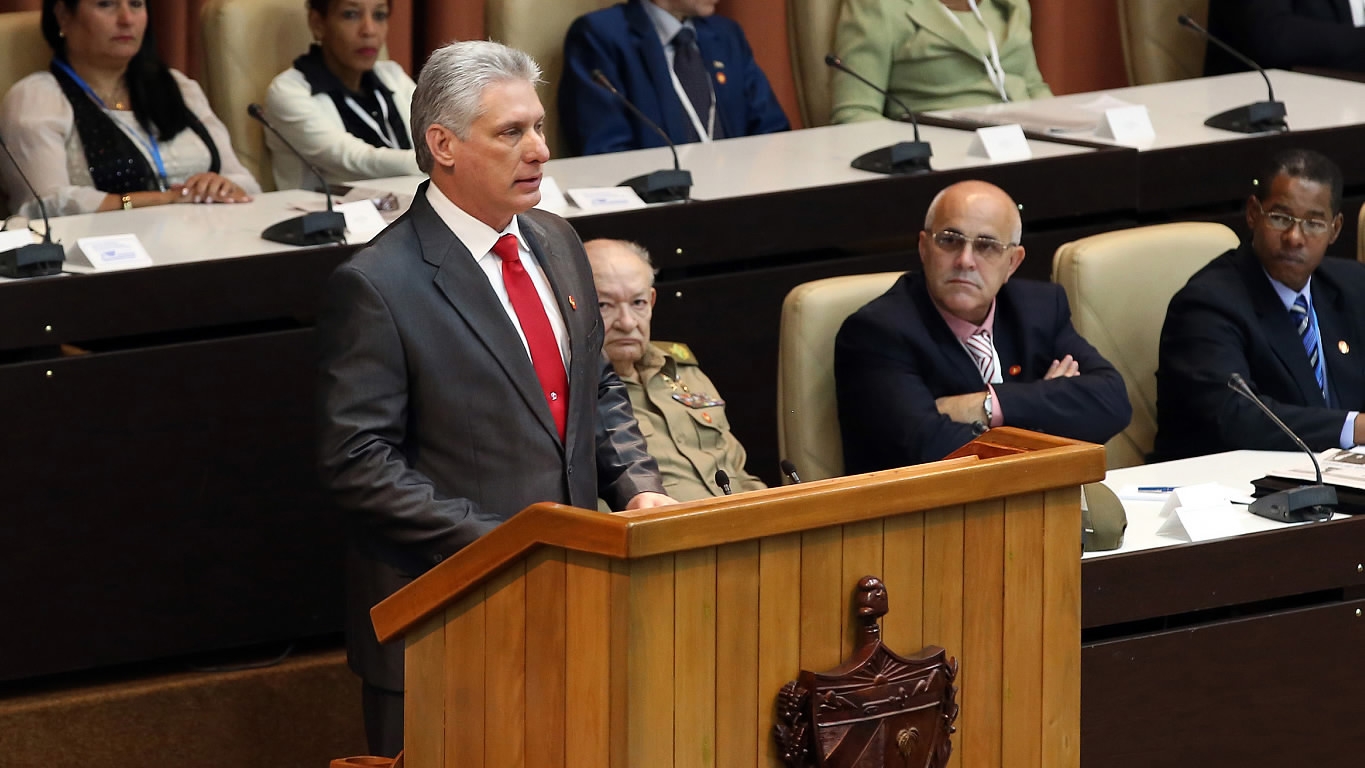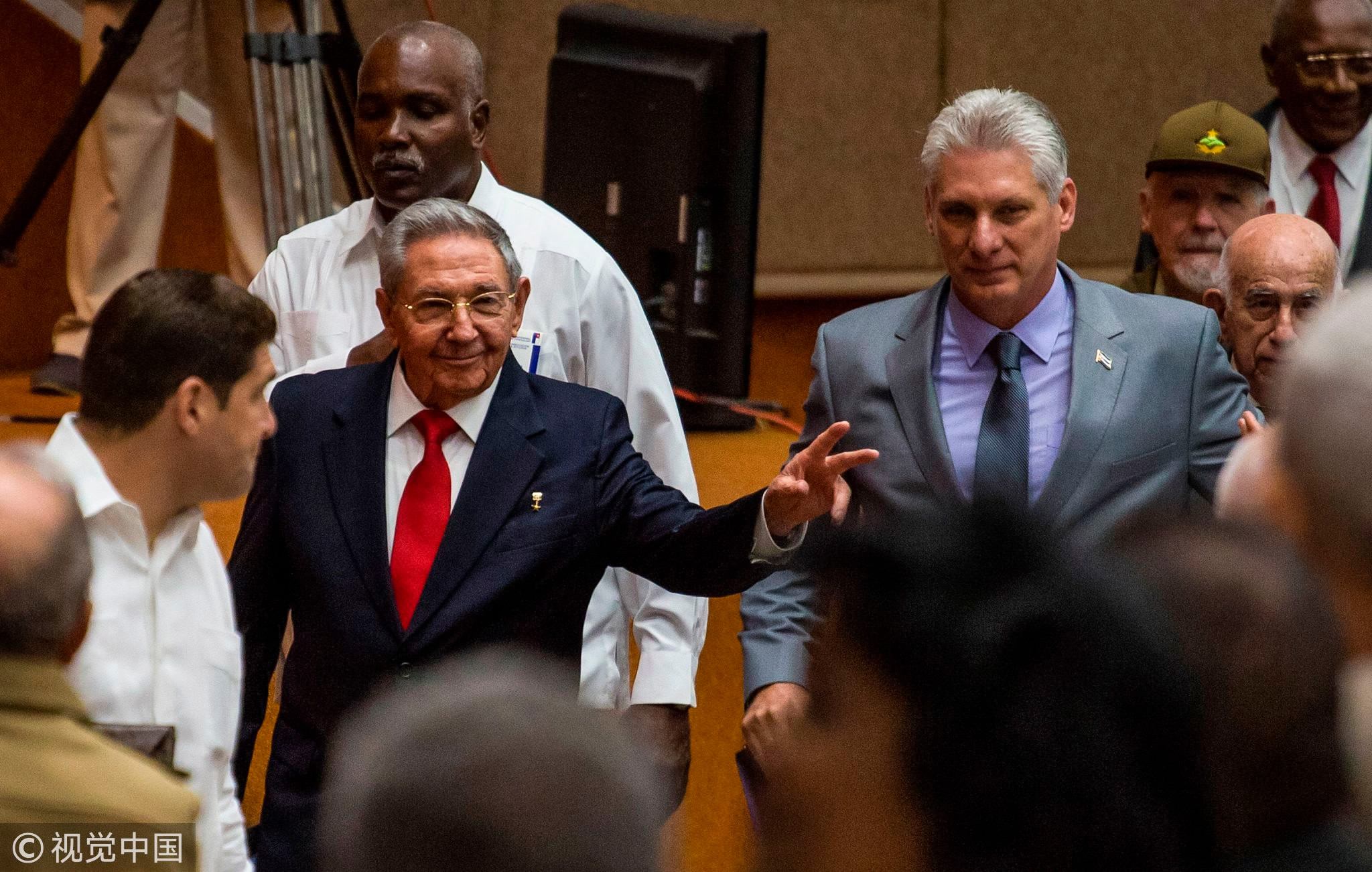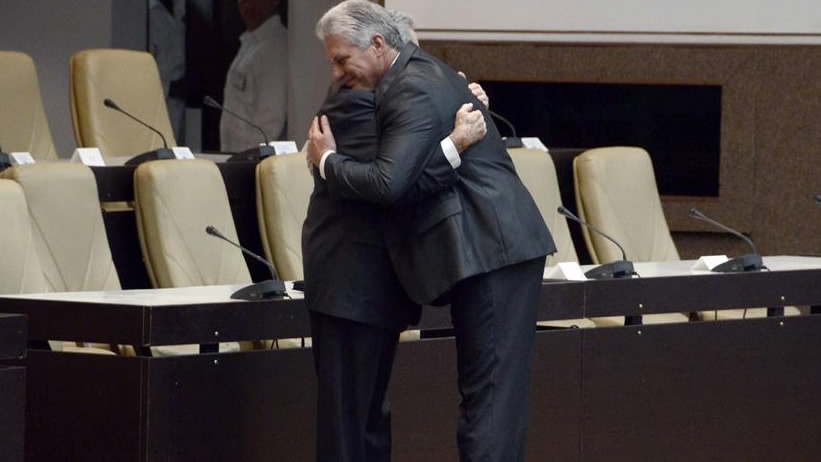02:38

Miguel Diaz-Canel was elected to succeed Raul Castro as Cuba’s new president at a plenary session of the National Assembly on Thursday.
The country's National Assembly announced that Diaz-Canel won 99.83 percent affirmative vote.
In his first speech as the new head of state before the National Assembly, Diaz-Canel said that "in this new legislature, there will be no space for those aspiring to a capitalist restoration."
"Only for those aspiring to continue improving our socialism," said the president.

Cuban President Raul Castro (L) and First Vice-President Miguel Diaz-Canel (C) arrive for a National Assembly session that named the latter as the candidate to succeed Castro as president, in Havana, April 18, 2018. /VCG Photo
Cuban President Raul Castro (L) and First Vice-President Miguel Diaz-Canel (C) arrive for a National Assembly session that named the latter as the candidate to succeed Castro as president, in Havana, April 18, 2018. /VCG Photo
Diaz-Canel said that "by decision of the people, the only choice we have is to continue the work started by the founding fathers of Cuban revolution in 1959, through the unity of all the generations of Cubans."
The leader highlighted the responsibility of taking the presidential office and remarked that he "will fulfill with honor the orders of the people, following the steps of the historic first generation of the revolution."
Regarding the election of the new legislature, Diaz-Canel described it as the "ratification of the democracy," with the main protagonist being the Cuban people.
"It is a legislature, which emerged from the people, who will control its function and will participate in the decision of measures and the implementation of the approved policies," Diaz-Canel said.
After handing over the presidency to his successor, Castro, 86, remains a lawmaker in the parliament and as the first secretary of the Central Committee of the ruling Communist Party of Cuba, which is considered the leading force of Cuban society.
Diaz-Canel acknowledged Castro as an elder statesman who after two consecutive terms continues to enjoy trust and affection of the people.

The newly elected president of the Council of State of Cuba, Miguel Diaz-Canel, delivers a speech after the announcement of his election during a session of Cuba's National Assembly of People's Power, in Havana, capital of Cuba, April 19, 2018. /Xinhua Photo
The newly elected president of the Council of State of Cuba, Miguel Diaz-Canel, delivers a speech after the announcement of his election during a session of Cuba's National Assembly of People's Power, in Havana, capital of Cuba, April 19, 2018. /Xinhua Photo
"Knowing people's feelings in favor of Raul Castro, he will continue to head the most important decisions regarding the country's present and future," Diaz-Canel said at the plenary session of the parliament.
Since taking office as acting president of Cuba in 2006, Raul Castro has led a complex reform process designed to modernize the island "with serenity, firmness, modesty and without being intractable," said Diaz-Canel.
"He will continue as First Secretary because he is an example to every Cuban revolutionary and communist, and because Cuba needs him to offer his ideas, and to warn of any mistakes and flaws," said Diaz-Canel.
The new president tried to allay any fears sparked by the transition, which marks the first time since the 1959 Revolution that Cuba's president is not one of the main architects of the revolutionary movement.
"I know the concerns and expectations raised by a moment like this, but we can count on the strength and intelligence of our people, the leadership of the communist party, the legacy of Fidel Castro, and the presence of Raul Castro, the current leader of our revolutionary process," said Diaz-Canel.
The new president highlighted some of Raul Castro's main achievements during his 10 years in office, including restoring diplomatic ties with the United States, driving Latin American and Caribbean integration, and helping the Colombian government and FARC guerrillas reach a definitive peace deal by backing and hosting the talks in Havana.

Raul Castro (L) hugs with Miguel Diaz-Canel during the closing ceremony of a session of Cuba's National Assembly of People's Power, in Havana, capital of Cuba, April 19, 2018. /Xinhua Photo
Raul Castro (L) hugs with Miguel Diaz-Canel during the closing ceremony of a session of Cuba's National Assembly of People's Power, in Havana, capital of Cuba, April 19, 2018. /Xinhua Photo
The 57-year-old Diaz-Canel has spent a long time serving in the Communist Party of Cuba. He headed Villa Clara Province from 1994 to 2003 and became the first secretary of the more populous province of Holguin in eastern Cuba in 2003, as well as becoming a member of the Politburo of Communist Party of Cuba.
He served as the minister of higher education before he was elected the first vice president of the Council of State in 2013.
The official newspaper in Cuba, Granma, has a series of stories on Diaz-Canel receiving leaders from foreign countries and making trips abroad. He headed a delegation group to China in 2015, the year when the two countries celebrated the 55th anniversary of the establishment of diplomatic relations.
Diaz-Canel has a reputation for being liberal and supports gay rights, greater press freedom, and access to the Internet.





